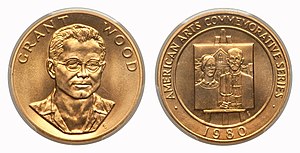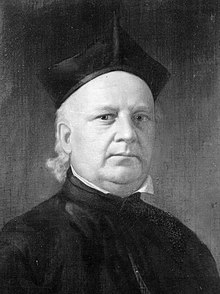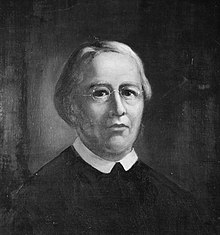Portal:United States
Introduction

| |

| |
Did you know (auto-generated) -

- ... that a solvent company can access the bankruptcy courts by doing the Texas two-step?
- ... that the Supreme Court has been cited as a vector of democratic backsliding in the United States?
- ... that during his mayoralty, Fiorello La Guardia appointed the first black woman judge in the United States?
- ... that the United States Supreme Court has struck down Texas's congressional and legislative districts numerous times?
- ... that the first United States court case to recognize moral rights in authorship involved the use of music by four Soviet composers in the 1948 Cold War film The Iron Curtain?
- ... that opera composer and librettist Joseph Redding was also a chess expert and lawyer who argued a landmark decision before the United States Supreme Court?
- ... that the United States Army Replacement and School Command reached its peak in May 1945 with 481,000 personnel?
- ... that Frances Cleveland was the first United States first lady to have dedicated journalists write about her activities?
Selected society biography -
Born into a wealthy, established family in Milton, Massachusetts, Bush was raised in Greenwich, Connecticut. He attended Phillips Academy and served as a pilot in the United States Navy Reserve during World War II before graduating from Yale and moving to West Texas, where he established a successful oil company. Following an unsuccessful run for the United States Senate in 1964, he was elected to represent Texas's 7th congressional district in 1966. President Richard Nixon appointed Bush as the ambassador to the United Nations in 1971 and as chairman of the Republican National Committee in 1973. President Gerald Ford appointed him as the chief of the Liaison Office to the People's Republic of China in 1974 and as the director of Central Intelligence in 1976. Bush ran for president in 1980 but was defeated in the Republican presidential primaries by Reagan, who then selected Bush as his vice presidential running mate. In the 1988 presidential election, Bush defeated Democrat Michael Dukakis.
Foreign policy drove Bush's presidency as he navigated the final years of the Cold War and played a key role in the reunification of Germany. He presided over the invasion of Panama and the Gulf War, ending the Iraqi occupation of Kuwait in the latter conflict. Though the agreement was not ratified until after he left office, Bush negotiated and signed the North American Free Trade Agreement, which created a trade bloc consisting of the United States, Canada and Mexico. Domestically, Bush reneged on a 1988 campaign promise by enacting legislation to raise taxes to justify reducing the budget deficit. He championed and signed three pieces of bipartisan legislation in 1990, the Americans with Disabilities Act, the Immigration Act and the Clean Air Act Amendments. He also appointed David Souter and Clarence Thomas to the Supreme Court. Bush lost the 1992 presidential election to Democrat Bill Clinton following an economic recession, his turnaround on his tax promise, and the decreased emphasis of foreign policy in a post–Cold War political climate. (Full article...)
Selected image -
Selected culture biography -
After expanding on Neuromancer with two more novels to complete the dystopic Sprawl trilogy, Gibson became a central figure to an entirely different science fiction subgenre – steampunk – with the 1990 alternate history novel The Difference Engine, written in collaboration with Bruce Sterling. In the 1990s he composed the Bridge trilogy of novels, which focused on sociological observations of near future urban environments and late-stage capitalism. His most recent novels – Pattern Recognition (2003) and Spook Country (2007) – are set in a contemporary world and have put Gibson's work onto mainstream bestseller lists for the first time.
To date, Gibson has written more than twenty short stories, nine novels (one in collaboration), a nonfiction artist's book, and has contributed articles to several major publications and collaborated extensively with performance artists, filmmakers and musicians.
Selected location -
The city was named for John Young, an early settler from Whitestown, New York, who established the community's first sawmill and gristmill. Youngstown is located in a region of the United States that is often referred to as the Rust Belt. Traditionally known as a center of steel production, Youngstown was forced to redefine itself when the U.S. steel industry fell into decline in the 1970s, leaving communities throughout the region without major industry.
Selected quote -
Anniversaries for March 30
- 1822 – The Florida Territory is formed under the control of the United States after the East Florida territory and part of the West Florida territory were ceded to the U.S. by the Kingdom of Spain as part of the Adams–Onís Treaty.
- 1842 – Anesthesia is used for the first time in an operation by Dr. Crawford Long.
- 1858 – Hymen Lipman patents a pencil with an attached eraser.
- 1867 – Alaska is purchased for $7.2 million, about 2 cent/acre ($4.19/km²), by United States Secretary of State William H. Seward (pictured). The news media of the day call the transaction Seward's Folly.
- 1870 – Texas is readmitted to the Union following Reconstruction.
- 1981 – President Ronald Reagan is shot in the chest outside a Washington, D.C., hotel by John Hinckley, Jr..
Selected cuisines, dishes and foods -

The cuisine of the American Midwest draws its culinary roots most significantly from the cuisines of Central, Northern and Eastern Europe, and Indigenous cuisine of the Americas, and is influenced by regionally and locally grown foodstuffs and cultural diversity. (Full article...)
Selected panorama -
More did you know? -
- ... that over 400 species of birds (state bird, Brown Thrasher, pictured) have been recorded in the American state of Georgia?
- ... that the book The Complex: How the Military Invades Our Everyday Lives explores U.S. military expenditures on items including Southern catfish restaurants and Dunkin' Donuts?
- ... that the book Beyond the First Amendment argues freedom of speech on the Internet is not easily addressed by the First Amendment to the United States Constitution?
Topics
Categories
Featured content
List articles
|
Culture Education Economy |
Geography Government
History |
Law Media Natural history |
People Protected areas Religion Transportation |
Tasks
Featured article candidatesTotal pages in content type is 4 Featured list candidatesTotal pages in content type is 6 Good article nominees
Total pages in content type is 91 | ||||
|
To create
To discuss on Articles for deletion
To expand To destub |
Assessment requests New articles Most Popular pages To find images |
Maintenance and cleanup
Other issues
| ||
Related portals
State-related
Region or city-related
Sports-related
Transportation-related
Other US-related
Nearby areas
WikiProjects
Associated Wikimedia
The following Wikimedia Foundation sister projects provide more on this subject:
-
Commons
Free media repository -
Wikibooks
Free textbooks and manuals -
Wikidata
Free knowledge base -
Wikinews
Free-content news -
Wikiquote
Collection of quotations -
Wikisource
Free-content library -
Wikiversity
Free learning tools -
Wikivoyage
Free travel guide -
Wiktionary
Dictionary and thesaurus
More portals



































































